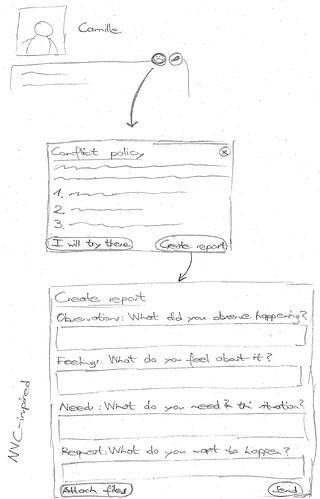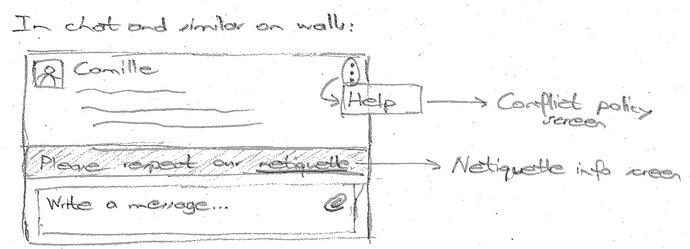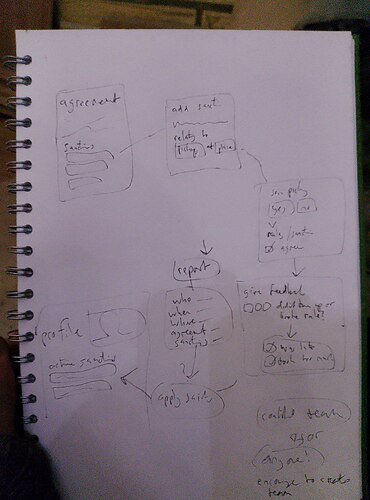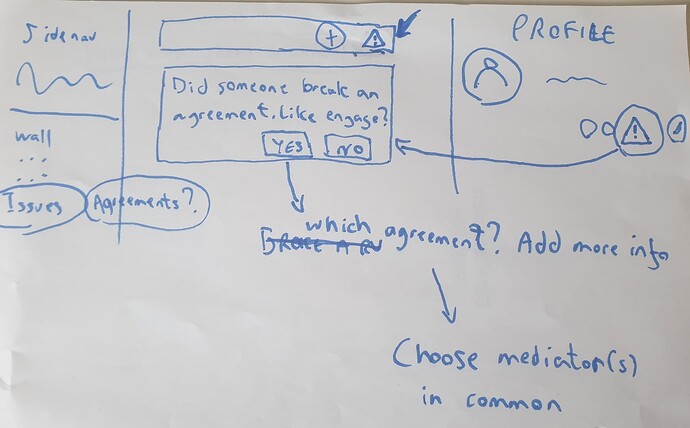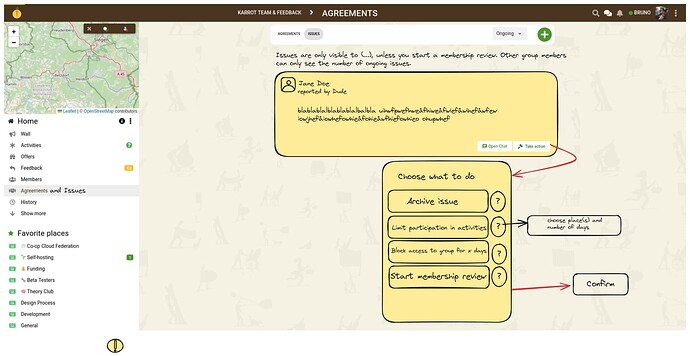2nd meeting 24/10
Participants: Bruno, Nick, Daniel
-
check-in
-
duration 1h15
-
quick recap last session
- round
- Nick
- chats about how to get ppl motivated
- there was a team in Warsaw and that fell back to zero
- had troubles with people thikning the mediation team is not fair enough
- used other tools
- encourage to contact the person first in case of conflicts
- struggle to do the work
- inevitably a problem with the size of the group, getting too big gets problematic
- they had yellow card and red card, their own system of sanctions
- chatted about official rules giving legitimacy
- division between technical conflicts (about the rules) and personal
- Bruno
- situation in warsaw familiar with topics in soliyl
- previouly dealt with conflicts more on a personal level
- but more recently trying to be more professional about it, and refer to rules
- meditation group attempted, but never worked
- conflict issues falls back to the board
- the board gives out warnings, can pause people from participating, either in certain places or in general, for a period of time
- Nick
- round
-
how things work in FSLux and main challenges
- system quite similar to warsaw
- legal association is split into projects
- foodsaving (biggest part)
- has own mediatation team / conflict resolution
- contact /complaint form
- email address, people send proof/screenshots
- rules
- 5 people, before used to be 3, but mostly 2 doing it, and having too much workload
- have quite clear rules
- have sanctions, e.g.:
- you cannot pickup for 2 weeks
- team sends a message to tell them
- no technical action happens
- works for most cases
- the team checks people respect that
- if they don’t, it would be escalation of further rule violation
- if you do really bad stuff, can request the board to remove someone from the whole association
- e.g. going to supermarket and asking to work with another association (stealing co-operations)
- board has a guideline to follow
- can ask for external mediation, some people do pro bono mediation, never was used though
- parties need to agree to do a mediation, and if one doesn’t agree, cannot do it
- most things are done by sayng you didn’t follow a rule and quite clear
- more personal conflicts need proper meditation, but many people don’t want to spend time going somewhere to meet someone doing meditation
- can ask for external mediation, some people do pro bono mediation, never was used though
- lots of people, divided into regions, have meetings, but not everyone attends
- people don’t always know each other
- encourage each project to think about their own procedure
- suggest to other projects they might want to have a process, otherwise it comes to the board
- better to resolve them more closely to where things happen
- a idea to introduce responsiblity to remove responsiblity from the board and give it to a judge-like role, but hasn’t been implemented, idea to have more neutral person
- how people join the conflict resolution team?
- say you want to help out, circle decides whether they need help or not
- have a guideline about how to handle conflicts
- talking to the person first, using NVC, escalating.
- other projects are:
- foodsaving points (public fridges)
- no conflict resolution process defined
- … but situations did come up
- wasn’t clear who is doing the maintenance
- might create one role for that
- 20-30 people here, people don’t always know each other
- communication circle
- does a lot!
- media prescence, interviews, speaking to external, potential partners, replying to requests, political work, meeting politicians, public face
- try to get some funding
- no conflict resolution process defined yet
- smaller group, 4-5 people, could put conflicts on the agenda
- difference between active members or volunteers that do a specific task, but no meeting
- active members engage with organisation things, be in a role
- foodsaving points (public fridges)
- foodsaving (biggest part)
-
check Excalidraw Excalidraw | Hand-drawn look & feel • Collaborative • Secure
- check the dots on the different versions
- reds and yellows on 2 and 4
- a defined role is crucial
- but that is a social thing, hard to enforce on Karrot
- observation that not everything needs to be implemented as a feature, not necessarily need to enact it
- reminder instead of a direct report
-
sketches
- Nick
- focus on sanctions rather than general conflicts
- add sanctions that go with the agreements
- relates to an activity type or place
- in the confirmation dialog it could show sanctions
- sanctions is a cold word
- a tick box showing that you agree, when somebody is in the act of doing somwthing
- on the button “didn’t show up” add a “did they break a rule?”
- magic box of apply sanctions, not sure who
- active sanctions on the profile
- report on who, where, what, agreement…
- a big mistery on how to apply the decision
- started going into roles
- conflict team, if nothing set up, fallback on a “anyone”
- Daniel
- starting point the sad smiley on the profile page
- conflict policy: “I will try this” or “report”
- report with clear questions, inspired on NVC, not confusing observations with feelings
- attach files
- send to people in charge
- on the chat/wall, the three dots and the conflict policy screen
- a reminder every now and then, should be a bit annoying maybe
- Bruno
- on issues/agreements section
- on agreements page, ! point button
- did someone break an agreement? want to engage with other people about it?
- alternative path via the profile page
- select which agreement it relates to, add more info
- choose mediator(s) in common, could be a team
- important, not something open to whole group, problematic to make things too public in whole group, make sure it’s a smaller group
- like fallback ideas, if you can’t find people in comon, or don’t have team, fallback to group
- have bell notification if you are called to help out with a report
- reactions, comments…
- Nick
- central question of who’s gonna deal with it keeps coming up
- one thing that is promising with the roles is to focus less on the technical details but representing in a group
- that might help, if it’s clear who’s dealing resolves these tricky questions
- in FS they’ve had problems with the report button
- ideally needs to be closest possible to the situation
- without knowing where to direct the report to, it’s hard to make a feature functional
- tieing up with other features are details compared to this central question
- likes the idea of making things visible in the right context
- feeble response just adding a button
- my sketches feel more technocratic
- Daniel
- liked the part about how to create the sanctions
- linked to place types
- agreement feature can be reused, like a specific category
- conflict policy can be shown in different places, like a category in agreements
- Bruno
- noticed not so much effort put into the definition of sanctions, but means we have identified something important
- not sure if I agree with nick, about whether we need to enact actions in the software, could end up with a design that’s just a text box describing outcomes that poeple have decided, but not enforced actions within the software
- how to reach the simpliest yet most effective design that would make the biggest improvement, as it can get quite complex
- still have faith in the idea of mechanism to force people to adopt the role (meditation/conflict)
- if we have software-enacted sanctions, definately need define somewhere in the code who will do it, ca find ways to help groups get people to take reponsiblity
- e.g. new groups prompt to make a team, or fallback to wider group
- Nick
- how to make the software know who can something
- groups have governance procedures outside the software
- Nick
- Nick
-
check out
